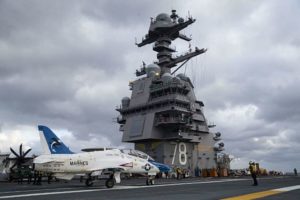The new Acting Secretary of the Navy James McPherson decided to suspend a six-month study on the future of aircraft carriers begun by is predecessor, former Acting Secretary Thomas Modly.
“Acting Secretary of the Navy James E. McPherson recently determined the Department of the Navy will not, for the time being, move forward with the Future Carrier 2030 effort,” Cmdr. Sarah Higgins, a Navy spokeswoman, said in a statement.

The Navy Department “will fully support the Department of Defense’s internal study on future force structure requirements, which will include a carrier review. Other DON initiatives, like Stem to Stern, Education for Seapower, and Make Ford Ready summits, will continue,” she added.
Modly commissioned the Blue-Ribbon Future Carrier 2030 (FC-2030) Task Force in March to detail the role of carrier-based naval aviation in a vision of the future competitive global security environment (Defense Daily, March 10).
At the time, he said it would consider both manned and unmanned aviation, cost, survivability, and sustaining the industrial base while considering principles of deterrence, global presence missions, protecting economic security, and potential combat with possible adversaries.
During the announcement Modly said the task fore work would be complementary to the broad review of national shipbuilding requirements currently underway by Deputy Secretary of Defense David Norquist.
“Because we have four new Ford carriers under contract, we have some time to reimagine what comes next,” Modly said during the announcement.
Modly resigned last month following criticism of his removal of the commander of an aircraft carrier dealing with a COVID-19 outbreak and was temporarily replaced by McPherson who was himself recently confirmed as Under Secretary of the Army (Defense Daily, April 8)
President Trump nominated the U.S. Ambassador to Norway Kenneth Braithwaite as the next top Navy civilian. He appeared before the Senate Armed Services Committee last week for his nomination hearing (Defense Daily, May 7).
In answers to advance policy questions before the hearing, Braithwaite was asked about his views on the need to consider alternative carrier designs given the Future Carrier 2030 Task Force.
Braithwaite largely supported the Ford-class carrier program but is open to other options that provide the right capabilities.
“It is my understanding that a 2016 study completed by the RAND corporation, which examined notional aircraft carrier variants that could replace or supplement the FORD Class CVN, confirmed the design attributes of the FORD Class CVN in a near-peer conflict. It is further my understanding that the capabilities of survivability, maintainability, and power projection have been designed into our FORD-class CVNs to support the high-end fight,” he said
“However, should circumstances change, I will keep an open mind to other alternatives that provide the right warfighting capabilities required by the Combatant Commanders,” Braithwaite added.